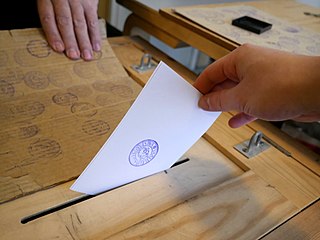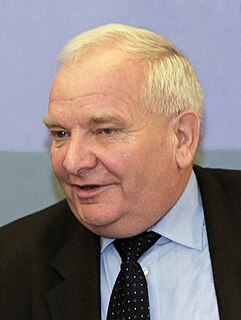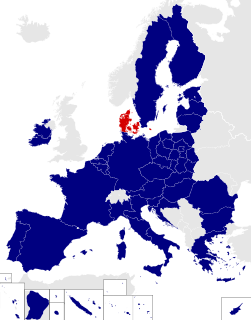Two member states of the European Union held elections to the European Parliament in 2007. For details, see
| This European election-related article is a stub. You can help Wikipedia by expanding it. |
Two member states of the European Union held elections to the European Parliament in 2007. For details, see
| This European election-related article is a stub. You can help Wikipedia by expanding it. |

The European Parliament (EP) is the legislative branch of the European Union and one of its seven institutions. Together with the Council of the European Union, it adopts European legislation, normally on a proposal from the European Commission. The Parliament is composed of 705 members (MEPs). The Parliament represents the second-largest democratic electorate in the world and the largest trans-national democratic electorate in the world.

The president of the European Commission is the head of the European Commission, the executive branch of the European Union. The president of the Commission leads a cabinet of commissioners, referred to as the college, collectively accountable to the European Parliament. The president is empowered to allocate portfolios amongst, reshuffle or dismiss commissioners as necessary. The college directs the Commission's civil service, sets the policy agenda and determines the legislative proposals it produces. (The Commission is the only body that can propose EU laws.

A Member of the European Parliament (MEP) is a person who has been elected to serve as a popular representative in the European Parliament.

There are four types of elections in Finland. Each Finnish citizen at least 18 years of age has the right to vote in each of the elections, which decide the following: the president, the parliament, the MEPs, and the municipal and city councils.

Elections to the European Parliament were held between 10 and 13 June 2004 in the 25 member states of the European Union, using varying election days according to local custom. The European Parliamental parties could not be voted for, but elected national parties aggregated in European Parliamental parties after the elections.

The President of the European Parliament presides over the debates and activities of the European Parliament. They also represent the Parliament within the EU and internationally. The president's signature is required for enacting most EU laws and the EU budget.

A European political party is a type of political party organisation operating transnationally in Europe and in the institutions of the European Union. They are regulated and funded by the European Union and are usually made up of national parties, not individuals. Europarties have the exclusive right to campaign during the European elections and express themselves within the European Parliament by their affiliated political groups and their MEPs. Europarties, through coordination meetings with their affiliated heads of state and government, influence the decision-making process of the European Council. Europarties also work closely and co-ordinate with their affiliated members of the European Commission and, according to the Lisbon Treaty the Europarty that wins the European elections has the right to nominate to the European Council its candidate for President of the European Commission.

Elections to the European Parliament take place every five years by universal adult suffrage, and with more than 400 million people eligible to vote, it is considered the second largest democratic elections in the world.

The politics of the European Union are different from other organisations and states due to the unique nature of the European Union (EU). The EU is similar to a confederation, where many policy areas are federalised into common institutions capable of making law; however the EU does not, unlike most states, control foreign policy, defence policy or the majority of direct taxation policies. These areas are primarily under the control of the EU's member states although a certain amount of structured co-operation and coordination takes place in these areas. For the EU to take substantial actions in these areas, all Member States must give their consent. EU laws that override national laws are more numerous than in historical confederations; however the EU is legally restricted from making law outside its remit or where it is no more appropriate to do so at a national or local level (subsidiarity) when acting outside its exclusive competencies. The principle of subsidiarity does not apply to areas of exclusive competence.

Elections in Portugal are free, fair, and regularly held in accordance with election law.
Estonia elects a legislature on the national level. The Riigikogu has 101 members, elected for a four-year term by proportional representation. A head of state - the president - is elected for a five-year term by parliament or an electoral college. Locally, Estonia elects local government councils, which vary in size. Election law states the minimum size of a council depending on the size of municipality. Local government councils are elected by proportional representation too.

In the United Kingdom (UK), each of the electoral areas or divisions called constituencies elects one member to the House of Commons.
Scotland has elections to several bodies: the Scottish Parliament, the United Kingdom Parliament, local councils and community councils. Before the United Kingdom left the European Union, Scotland elected members to the European Parliament.

Elections to the European Parliament were held in the 27 member states of the European Union (EU) between 4 and 7 June 2009. A total of 736 Members of the European Parliament (MEPs) were elected to represent some 500 million Europeans, making these the biggest trans-national elections in history. An additional 18 observers were pre-elected.

There are fourteen Vice-Presidents of the European Parliament who sit in for the President in presiding over the plenary of the European Parliament.

Romania elected its members of the European Parliament for the first time on 25 November 2007; the election was initially scheduled for 13 May, but the PM postponed it for domestic political reasons. A referendum on a new voting system for national parliamentary elections was held on the same day.

Denmark is one single European Parliament constituency. Since the June 2009 Parliament election it has been represented by thirteen members of the European Parliament. It covers the EU member state of Denmark, but not the Faroe Islands or Greenland which are not part of the EU.

The European Parliament election of 2009 in Bulgaria was held on Sunday 7 June 2009 and was the election of the delegation from Bulgaria to the European Parliament. As a result of the Treaty of Nice – that became active in November 2004 – the number of Bulgarian delegates in the European Parliament decreased from 18 to 17 delegates. When the Treaty of Lisbon was ratified, the number of Bulgarian Delegates went back up to 18.

The European Parliament election of 2009 in Poland was the election of the delegation from Poland to the European Parliament in 2009 which took place on 7 June 2009. On 13 February the Sejm accepted a proposal for an amendment to the electoral court act to allow voting for the European Parliament election of 2009 to take place over 2 days i.e. the 6 and 7 June 2009. However, on 5 March, the proposal was referred to the Constitutional Tribunal of the Republic of Poland by the Polish President, Lech Kaczyński.

The Progressive Alliance of Socialists and Democrats (S&D) is the political group in the European Parliament of the Party of European Socialists (PES). The Progressive Alliance of Socialists and Democrats was officially founded as a Socialist Group on 29 June 1953 which makes it the second oldest political group in the European Parliament after the Alliance of Liberals and Democrats for Europe Group (ALDE). It adopted its present-day name on 23 June 2009. Centre-left in orientation, the group mostly comprises social-democratic parties and is affiliated with the Progressive Alliance.